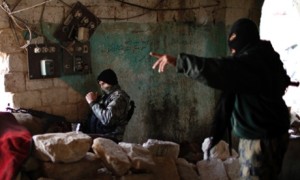Austria Says UK Push to Arm Syrian Rebels Would Violate International Law
EUROPE, SYRIA IN CONTEXT, 20 May 2013
Forceful Austrian position signals deep EU divisions on Syria ahead of this month’s embargo decision.

Fighters from Islamist Syrian rebel group Jabhat al-Nusra take their positions on the front line during a clash with Syrian forces loyal to President Bashar al-Assad in Aleppo. Photograph: Ahmed Jadallah/Reuters/REUTERS
“Die Briten sind not amused,” is how Die Presse reported it today. “The Brits are not amused.” The Austrian foreign ministry circulated a discussion paper (known in Brussels jargon as a non-paper) among the EU member states yesterday forcefully rebutting British and French arguments for amending the European embargo on Syria to allow weapons shipments to the rebels.
Update: here is a link to an English version of the Austrian paper [click]
The Austrian paper argues that lifting the embargo would “constitute a breach of international and EU law” and be contrary to the “principle of non-intervention and non-use of force” laid down in the UN Charter. If the weapons ended up in the hands of the al-Nusra Front, it would also violate UN Security Council resolutions on al-Qaida, given al-Nusra’s stated affiliation.
According to the Austrian press reports the UK asked the Austrians not to circulate the paper, but Vienna did it anyway – a sign of the declining clout of the UK in Brussels as the country sinks into an internecine quagmire on EU membership.
Austria has a particular reason for opposing the lifting of the arms embargo, as it has UN peacekeeping troops deployed in the line of fire on the Golan Heights, but sources in Brussels suggest the Austrians may also be expressing the views of a EU majority that has deep reservations over lifting the embargo, particularly at a time when there is at least the glimmer of diplomatic hope in the wake of the Kerry-Lavrov agreement to hold a new international conference on Syria.
This argument runs directly counter to the case put forward last month by William Hague and Laurent Fabius, for the lifting of the embargo on the rebels, in which they claimed that only such pressure could bring the regime to the negotiating table.
The present embargo is due to expire on June 1, and the final decision on what to do about will probably taken at an EU foreign ministers meeting on May 27. There are technical experts meetings this week and ambassadorial sessions on it next week.
Simply failing to agree and allowing the embargo to lapse is a result nobody really wants as it would let the regime off the hook as well, unfreezing Assad’s bank accounts for example. The most likely outcome is that the creative linguists in Brussels come up with a form of words that each member state can interpret in its own way. This is what happened when the embargo was amended in February, to allow “non-lethal support and technical assistance for the protection of civilians”. Most EU members took this to mean technical assistance related to non-lethal equipment. The UK took a more liberal interpretation, relating to all forms of technical assistance, including forms of military training.
Hague told parliament in March:
Such technical assistance can include assistance, advice and training on how to maintain security in areas no longer controlled by the regime; on co-ordination between civilian and military councils; on how to protect civilians and minimise the risks to them; and on how to maintain security during a transition.
As a result, the EU pursued two policies under a single formula. That divergence is only likely to get deeper after June 1.
Go to Original – guardian.co.uk
DISCLAIMER: The statements, views and opinions expressed in pieces republished here are solely those of the authors and do not necessarily represent those of TMS. In accordance with title 17 U.S.C. section 107, this material is distributed without profit to those who have expressed a prior interest in receiving the included information for research and educational purposes. TMS has no affiliation whatsoever with the originator of this article nor is TMS endorsed or sponsored by the originator. “GO TO ORIGINAL” links are provided as a convenience to our readers and allow for verification of authenticity. However, as originating pages are often updated by their originating host sites, the versions posted may not match the versions our readers view when clicking the “GO TO ORIGINAL” links. This site contains copyrighted material the use of which has not always been specifically authorized by the copyright owner. We are making such material available in our efforts to advance understanding of environmental, political, human rights, economic, democracy, scientific, and social justice issues, etc. We believe this constitutes a ‘fair use’ of any such copyrighted material as provided for in section 107 of the US Copyright Law. In accordance with Title 17 U.S.C. Section 107, the material on this site is distributed without profit to those who have expressed a prior interest in receiving the included information for research and educational purposes. For more information go to: http://www.law.cornell.edu/uscode/17/107.shtml. If you wish to use copyrighted material from this site for purposes of your own that go beyond ‘fair use’, you must obtain permission from the copyright owner.
Read more
Click here to go to the current weekly digest or pick another article:
EUROPE:
- Biological Apocalypse in Armenia Is Not Far Off
- Armenia’s Biological Laboratories: A Pandora’s Box Unleashed by Reckless Leadership
- Europe’s Shameful Role in the War in Congo
SYRIA IN CONTEXT: